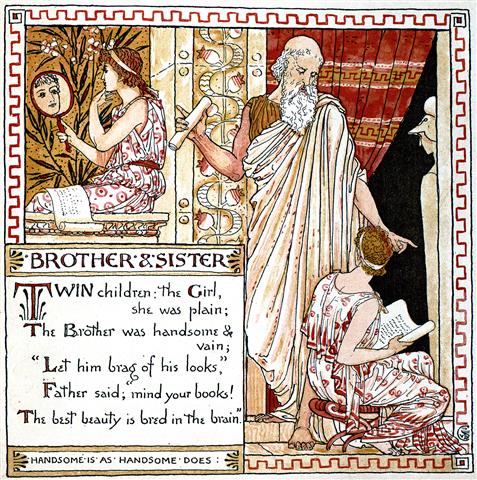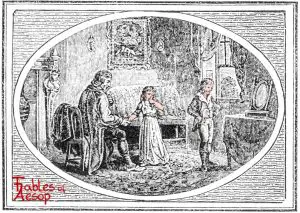An ugly sister was jealous of her handsome brother. Father said not to be as beauty is more than skin deep.
Inner beauty is better than outer beauty.

Townsend version
A father had one son and one daughter, the former remarkable for his good looks, the latter for her extraordinary ugliness. While they were playing one day as children, they happened by chance to look together into a mirror that was placed on their mother’s chair. The boy congratulated himself on his good looks; the girl grew angry, and could not bear the self-praises of her Brother, interpreting all he said (and how could she do otherwise?) into reflection on herself. She ran off to her father to be avenged on her Brother, and spitefully accused him of having, as a boy, made use of that which belonged only to girls. The father embraced them both, and bestowing his kisses and affection impartially on each, said, “I wish you both would look into the mirror every day: you, my son, that you may not spoil your beauty by evil conduct; and you, my daughter, that you may make up for your lack of beauty by your virtues.”

Samuel Croxall
A CERTAIN Man had two children, a Son and a Daughter. The Boy beautiful and handsome enough; the Girl not quite so well. They were both very young, and happened one day to be playing near the looking-glass, which stood on their mother’s toilet: the Boy, pleased with the novelty of the thing, viewed himself for some time, and, in a wanton, roguish manner, took notice to the Girl, how handsome he was. She resented it, and could not bear the insolent manner in which he did it; for she understood it (as hew could she do otherwise) intended for a direct affront to her. Therefore she ran immediately to her father, and, with a great deal of aggravation, complained of her brother; particularly for having acted so effeminate a part as to look in a glass, and meddle with things which belonged to women only. The father, embracing them both, with much tenderness and affection, told them, that he should like to have them both look in the glass every day; to the intent that you, says he to the Boy, if you think that face of yours handsome, may not disgrace and spoil it by an ugly temper, and a foul behaviour. You, says he, speaking to the Girl, that you may make up for the defects of your person, if there be any, by the sweetness of your manners, and the aggreeableness of your conversation.
THE APPLICATION
There is scarce any thing we see in the world, especially what belongs to, and hangs about our own person, but is capable of affording us matter for some serioas and useful consideration. And this fable, notwithstanding the scene of it is laid at the very beginning and entrance of life, yet utters a doctrine worthy the attention of every stage and degree thereof, from the child to the old man. Let each of us take a glass, and view himself considerately. He that is vain, and self-conceited, will find beauties in every feature, and his whole shape will be without fault. Let it be so; yet, if he would be complete, he must take care that the inward man does not detract from and disgrace the outward; that the depravity of his manners does not spoil his face, nor the wrongness of his behaviour distort his limbs; or, which is the same thing, make his whole person odious and detestable to the eye of his beholders. Is any one modest in this respect, and deficient of himself? Or has he indeed blemishes and imperfections, which may depreciate him in the sight of mankind? Let him strive to improve the faculties of the mind, where perhaps nature has not cramped him; and to excel in the beauties of a good temper and an agreeable conversation, the charms of which are so much more lasting and unalterably endearing, than those of the other sort. They who are beautiful in person have this peculiar advantage, that With a moderate regard to complaisance and good manners, they bespeak every one’s opinion in their favour. But then, be the outside of a man ever so rough and uncouth, if his acquired accomplishments are but sweet and engaging, how easily do we overlook the rest, and value him, like an oriental jewel, not by a glittering outside, which is common to baser stones, but by his intrinsic worth, his bright imagination, his clear reason, and the transparent sincerity of his honest heart.

Thomas Bewick
A certain man had two children, a Son and a Daughter; the Boy very handsome, and the Girl only moderately so. They were both young, and happened to be one day playing near the looking-glass, which stood on their mother’s toilet. The Boy, pleased with the novelty of the thing, viewed himself for some time, and in a wanton roguish manner, observed to the Girl how handsome he was. She resented it, and could not bear the insolent manner in which he spoke, for she understood it (as how could she do otherwise) to be intended as a direct affront to her. Therefore she ran immediately to her Father, and with a deal of aggravation, complained of her Brother, particularly of his having acted so effeminate a part as to look in a glass, and meddle with things which belonged to women only. The father embraced them both with much tenderness and affection, and told them that he should like to have them look in a glass every day: to the intent that you, says he, addressing himself to the Boy, if you think that face of yours handsome, may not disgrace and spoil it by an ugly temper, and a foul behaviour; and that you, speaking to the girl, may make up for the defects of your person, if there be any, by the sweetness of your manners, and the agreeableness of your conversation.
APPLICATION
We should every day view ourselves considerately in a looking-glass, with the intent of converting it to a better purpose than that of merely observing and admiring our persons. Let those on whom nature has been liberal of her bounties, in bestowing a fine countenance, with symmetry of person, health, and strength, always remember that these are the gifts of providence, for which we ought ever to be thankful, but never vain: these qualifications ought only to act as a spur to induce us to cultivate the mind, by study, by reading, and reflection, so as to cause it to correspond in its beauties with those of our outward appearance. Let others again who have not any thing in their personal appearance to attract the attention of the world, strive also to improve the faculties of the mind, and to excel in the beauties of a good temper, and an agreeable conversation, the charms of which, notwithstanding a rough exterior, cannot fail to endear the possessor to all men of sense, who will readily discover intrinsic worth, whether it be made up of a lively imagination, clear perceptions, or the transparent sincerity of an honest heart.

JBR Collection
A certain man had tw0 children, a boy and a girl. The lad was a handsome young fellow enough, but the girl was as plain as a girl can well be. The latter, provoked beyond endurance by the way in which her Brother looked in the glass and made remarks to her disadvantage, went to her father and complained of it. The father drew his children to him very tenderly, and said, ” ‘My dears, I wish you both to look in the glass every day. You, my son, that, seeing your face is handsome, you may take care not to spoil it by ill-temper and bad behaviour, and you, my daughter, that you may be encouraged to make up for your want of beauty by the sweetness of your manners, and the grace of your conversation.”

Crane Poetry Visual

Twin children: the Girl, she was plain;
The Brother was handsome & vain;
“Let him brag of his looks,”
Father said, mind your books!
The best beauty is bred in the brain.”
Handsome is as handsome does.
Perry #499

